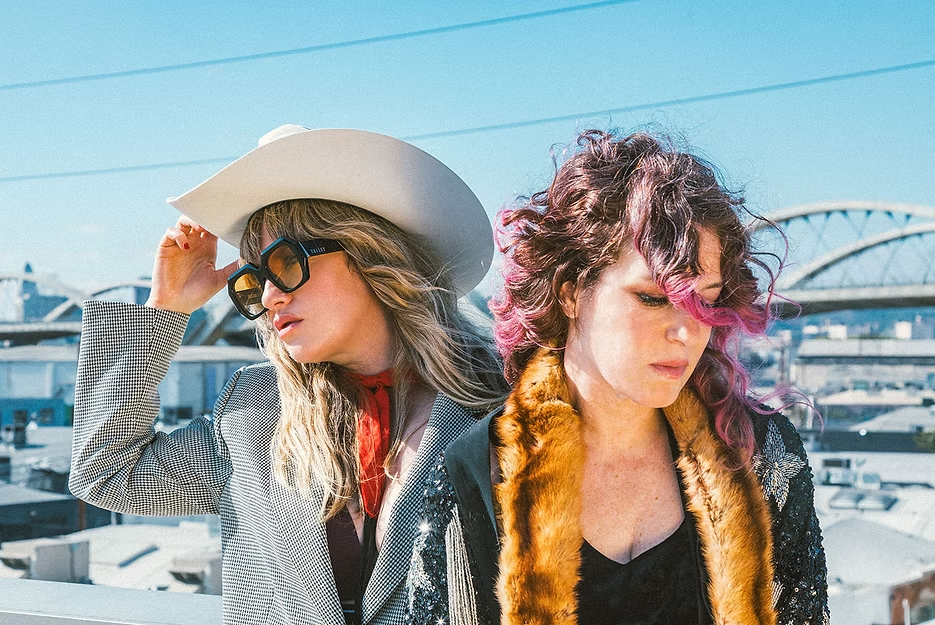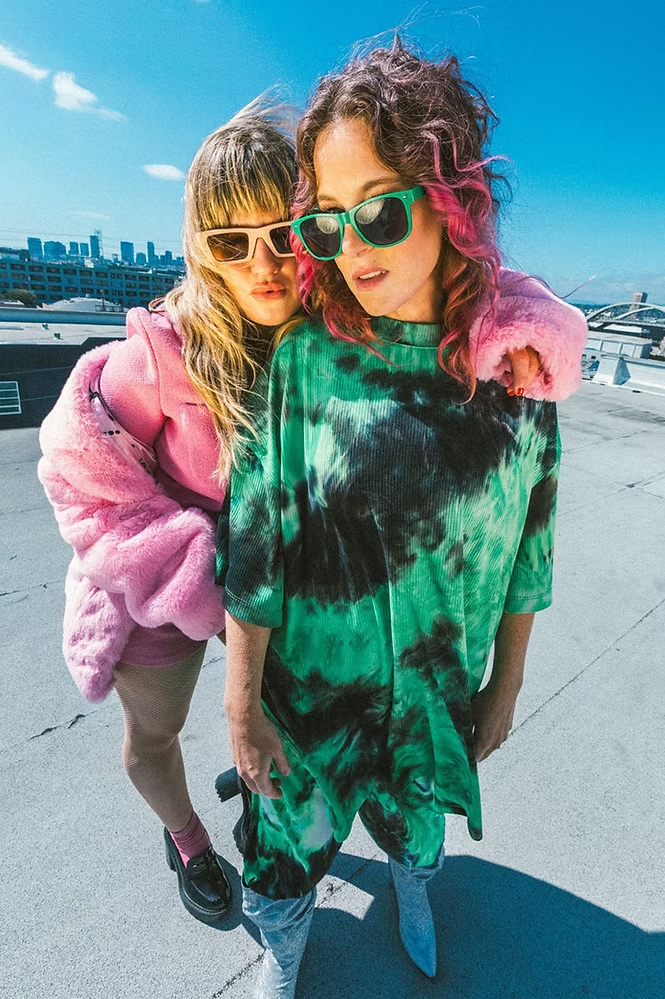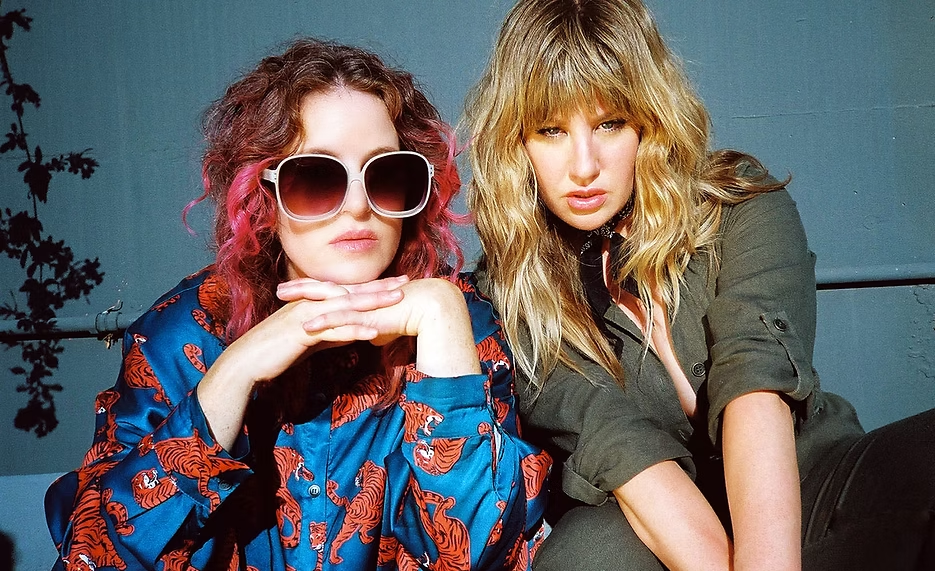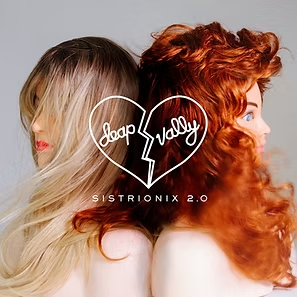
Story: Melanie Broussalian
Photos: James Dierx & Ericka Clevenger
Los Angeles-based rock duo Deap Vally have been making music together for upwards of 11 years, and guitarist and vocalist Lindsey Troy and drummer Julie Edwards have known each other even longer. But the last couple of years (and a societal history of patriarchy favoring all-male rock groups) demanded a hard look at their lives as musicians and mothers, and the two ultimately decided to dissolve the band.
Troy and Edwards tossed around ideas of how to satisfyingly end this chapter of their lives, and realized they were on the precipice of the 10-year anniversary of their ground stomping debut album, Sistrionix. Because the 2013 record was released on a major label–we’ll name and shame Island Records for this one–they quickly found out that not only could they not retrieve their masters, but they also earned practically no royalties from their own music. Thus, the idea of re-recording Sistrionix on their own label, and more importantly on their own terms, was born.
We talked to Julie Edwards in the midst of Deap Vally’s farewell tour and spoke to her about the process of recording Sistrionix 2.0, including B-sides that never made the original album, the challenges they faced as a “girl band” on a major label, and how they wanted to conclude this time in their lives with not a whimper, but a primal scream.

Bands Through Town: So, going back to the very beginning, do you remember the moment when you knew that Deap Vally was something that you and Linsey wanted to embark on together?
Julie Edwards: I had a knitting shop called The Little Knittery, which still exists, but I no longer own it. And Lindsey had come in around winter of 2010, because she wanted to learn how to knit, so she could knit stuff and sell it and make some cash around Christmas. So, she came in. I taught her how to knit. She came back. I taught her how to crochet. She was very dexterous. She learned really quick. And she just started coming in a lot and we would just talk.
We were both musicians. I was in my band, The Pity Party, and she had been trying to do this solo thing. She was on a major label and was kind of a failed teen pop star with her sister, which I found really fascinating. And she gave me her EP, her solo EP. And I remember closing up the shop and leaving for the day and put it in the CD player of my car and listening and being like, “Damn this girl’s voice.” I thought her voice was fantastic, like so muscular. I thought her lyrics were so concise and full of truth and wisdom and really interesting rhythmically. And I was just like, “I cannot believe there are people floating around not doing anything with this level of talent.”
And I had been wanting to do an all-female thing because I was just curious. So yeah, we decided to get together and jam. And we hadn’t considered being a two-piece; my friend Ashley Reeve was a sick bass player from this band called Great Northern that my old band Pity Party had played lots of shows with. So, Lindsey brought her guitar and some rough ideas. And Ashley brought her bass. And I had a practice space already and I had my drum kit, and we just kind of jammed. And it was really fun, really fun.
And actually, after that jam, we were called, God’s C*ntry. That was really going to go over well. It was so fun. It was so awesome. But what ended up happening is Ashley got hired to tour with Cee Lo Green or something huge and she just got busy forever. I think Lindsey and I just thought, “We can just carry on here, the two of us. Let’s do it.” So, we did. And Deap Vally was born.
BTT: What an origin story. And then fast forwarding to now, what was the primary motivation to put an end to Deap Vally? And how did you arrive at re-recording Sistrionix versus other albums or a greatest hits compilation?
Edwards: I was super burnt out, and I actually needed to leave Deap Vally; I wanted to quit the band. But I didn’t want to stand in the way of it. I was like “Lindsey, You do what you need. Here’s where all the bodies are buried. Let me know if you have any questions, but I have to peace out. I can’t be on this hamster wheel anymore.” So, she toured for a year with other drummers, and it was good, and she had fun. But I think we both realized the secret sauce is the two of us—both from just a business relationship standpoint and creatively. And I was like, “OK, I’ll come back. But on the condition that we can bring this to a satisfying conclusion.” Instead of sort of watching it go off the rails and disappear into the desert. This band deserves a punctuated moment, rather than a full fizzle out.
And I knew it was 10 years of Sistrionix and I really wanted to make sure we made it about that record. And I was like, “Maybe I can just get the masters back from Island Records.” Guess what? I couldn’t! I did all this accounting, and I went through all our contracts, and I went through all our income streams. I was like, “If we’re going to put this down, I want to make sure that we’re receiving some passive income. We’re protecting this time investment, this financial investment we’ve made of all these years.” And we’re protecting the legacy of this. I had looked into it, and I realized we’d never seen a cent from streams, downloads or sales of Sistrionix. But that’s just the way it is for most bands. Most bands aren’t looking into their accounting.
At first, we were just going to record some of the hits from there and have versions of those for ourselves to put out ourselves, and for sync and licensing, which was a big part of our business model. But the more I thought about it, on the 10-year mark of Sistrionix, what makes the most sense narratively, spiritually, psychically and financially is to re-record Sistrionix completely. And then also re-record some of the B-sides that got totally forgotten that we loved, but the label and our management decided that they weren’t the kind of products they wanted to push. Songs like “Drought,” “Ain’t Fair” and “Procreate,” that are just kick-ass-awesome songs that somebody decided would be buried.
Lindsey was super pregnant and super busy, and I was gung-ho about getting this done within this time frame that come July, when it was the10-year anniversary, this thing would be in the can and ready to at least be announced. So, I went into the studio and tracked a lot of the drums to silence, which sounds weird, but many of the songs we had played so much over the years that the minute my body started playing them, I heard Lindsey. Like, my body doing that motion combined with my brain and everything was there. So even though I was recording to silence, I wasn’t at all.
BTT: The muscle memory kicked in.
Edwards: Yeah, and the muscle memory was more than just my body playing drums. It was the whole experience. And then Lindsey came in when she could, and I would literally be like, “Lindsey, are you in labor today or can you come into the studio?” And she was like, “No, I don’t think I’m in labor yet.” So, she’d come in and do more. And then she went into labor and had a baby. Josiah Mazzaschi produced Sistrionix 2.0 and engineered it, and we did it at his studio, The Cave, in Los Angeles. He recorded our first demos before we had a record deal in 2011, so it was full circle, and he’s an old friend of mine. So, Josiah and I just went in. We would work the tracks to get them into a ready position for Lindsey to come and lay vocals, do some guitar overdubs and do bass. And then, the next time she came in, she had a six-week-old infant with her, and she finished tracking Sistronix 2.0 with that infant. So it was like she was giving birth to two babies at one time.
BTT: The re-records on Sistrionix 2.0 go so hard. The distortion and the energy that’s in there is so palpable just from the first note. Did you have a strategy for how you approached the re-records sonically?
Edwards: Thank you. For me it was to pull all the neurosis out of this record in these songs. The first time we made this record, we made it on a major label. There was a team of dudes at the label. There was high-powered management, and everybody had an idea of what it should sound [like], how it should be. It was supposed to cross over from rock into pop. We were the “Destiny’s Child of rock,” or whatever. All these weird things were happening. It was a neurotic process. And I feel like rock ‘n’ roll is not neurotic, it’s literally the opposite. You have wild noise, you have feedback, it’s out of control. And that’s the point.
And I just wanted Sistrionix 2.0 to be that. Let’s not stress about it. It is what it is. It always was what it was. And then our little trick to kind of give it that explosiveness that you feel when you watch it live—you know that it gets lost on a lot of records—was basically Lindsey doubling all the guitar with bass so that we had this like full like massive frequency range in all the riffs. And then also all the songs are [a] 1/2 step down from Sistrionix because that’s how we played them live all these years. So, we kept that integrity. In a way, it’s sort of a live record.

BTT: That’s awesome. It totally comes across too. I’d love to know how your relationship with these songs has changed over the last 10 years. Were there any songs that brought up any surprise or unexpected emotions, even including the demos?
Edwards: I would say “Procreate” was very quickly dismissed by the label and by management. It’s a song about being so hot for someone that you want to have their baby, right? So, I think considering that our whole team at the label at the time were men and our manager was a man, I think that something about this song was profoundly threatening. I think that no one was comfortable with it. And so, it got so quickly dismissed. It just turned into like a B-side that got forgotten and buried and we re-recorded that song. And I love that song. I can’t believe anyone took that song away from me and made me feel like there was something unrelatable about it.
BTT: Did you and Lindsey learn anything new about each other as a music-making unit during this process?
Edwards: I don’t know if we learned anything about each other per se. But I feel for the first time Lindsey really let me take the wheel and trusted my instincts and just let me lead and let me make sure it got done. Which was an aspect of this band that’s been frustrating for me over the years. Since we started the Farewell Tour, our relationship with each other is better than ever. It’s remarkable. We were going to do more couples therapy before this tour and we just didn’t have time, but somehow, we didn’t even need it. Something about the closure that we’re giving each other, and the fans and the project is just incredibly cathartic.
BTT: You touched on this a little bit, but what has the energy been like during these farewell shows?
Edwards: The energy is feral. It feels so good to be able to say goodbye. The performances are endowed with so much meaning. It’s not just another tour, it’s not just another record, we’ve been playing better than we’ve ever played. I think we’re tighter than we’ve ever been. I think the intentionality is so clear and so tight and so strong. And it feels really good. And this is the first time we’ve done everything for ourselves. I mean, we put it out ourselves. We have our own label, Deap Vally Records. We’re overseeing all of that. It’s all our money. The record has been out less than a month and we’ve already made more money off Sistrionix 2.0 than we ever did off Sistrionix.
When we were on the major label, they wanted our empowerment to just be this branding idea but not be true. They wanted to get in there and be involved and have us co-write with their people. They picked who were embedded with them and were usually dudes. It was like, “You guys represent empowerment, but actually, it’s false.” And we’re like, no, no, no, I don’t think you understand. We are empowerment. We did all this. We’re full human beings—this is what we wanted to do. This is where we ended up, this is what’s happening.”
And so, I think for the first time, even though it’s backbreaking to do it this way, honestly, it’s kind of insane. It is 1,000% true empowerment. We are doing everything. We are deciding everything. We are running everything. Yeah, we do have booking agents. I need to give credit where credit is due. We’re being booked by Space Agency in North America, and we’re being booked by William Morris overseas. But other than that, management, label, budgeting, tour managing, we’re doing all that.
BTT: I have one last question. I’d love to know what are your hopes for the future of music, in particularly for women in rock?
Edwards: I feel like I don’t need to have hopes for the future of music for women in rock because anytime I’m on Instagram, I see the level of technical skill and focus in these female musicians now are so crazy high. I seem to see a lot of female rock bands doing very, very well. So, I need to remind myself of that, actually, because I’m used to so many years where you’d want to sign to a label, or work with a management company, or a radio promo person, and they would be like, “I’m already working with a girl band.” So, I feel like that doesn’t exist anymore, and now that you can basically control your own marketing base to a great extent. I mean, the reality is honestly you need hundreds of thousands of dollars to really build your following to a certain size. Can we all be real about that? But you can really control your marketing base and you can possibly go viral, and if you’re like a kickass drummer or super riffy, you can share that, and people will follow you. There’s no guardians anymore. It’s all out there and you can find those people. Whereas, I feel like when we were coming up, it was us, Haim and Savages.
And I feel like now, there should be as many [girl bands] as there are guy bands. There shouldn’t even be a concept like a girl band, you know? Part of me, of course, like the selfish part of me, really wishes that we were coming up right now when there was so much support and so much space and much more understanding. But you know, it is what it is.
BTT: You laid the groundwork. You walked, so they all could run.
Edwards: Yeah, and others walked so we could run. I guess really what my hope is, it’s biological…I don’t know what has to happen with human beings and the world and society. But I feel like you probably have to choose at this point—if you are a touring musician—whether you’re going to have kids or whether you’re going to keep touring. And that, I don’t like. Even if I’m pushing up against a fundamental reality, I don’t like it. I want the opportunity to be equal. And I feel like if you had a baby and you left the baby at home and you went on tour for six weeks, everyone would think you should be in prison. Because what kind of a mother dot, dot, dot. And I know the same thing does not apply to Dad. I guess my hope would be, wouldn’t it be great if we could do it all and have it on and continue and not have this enormous interruption in our career if we wanted to have kids?
BTT: Yeah, say it louder for the people in the back. Thank you so much for taking the time out. I know that you’re super busy and in the midst of a huge tour right now. This has been really fun.

